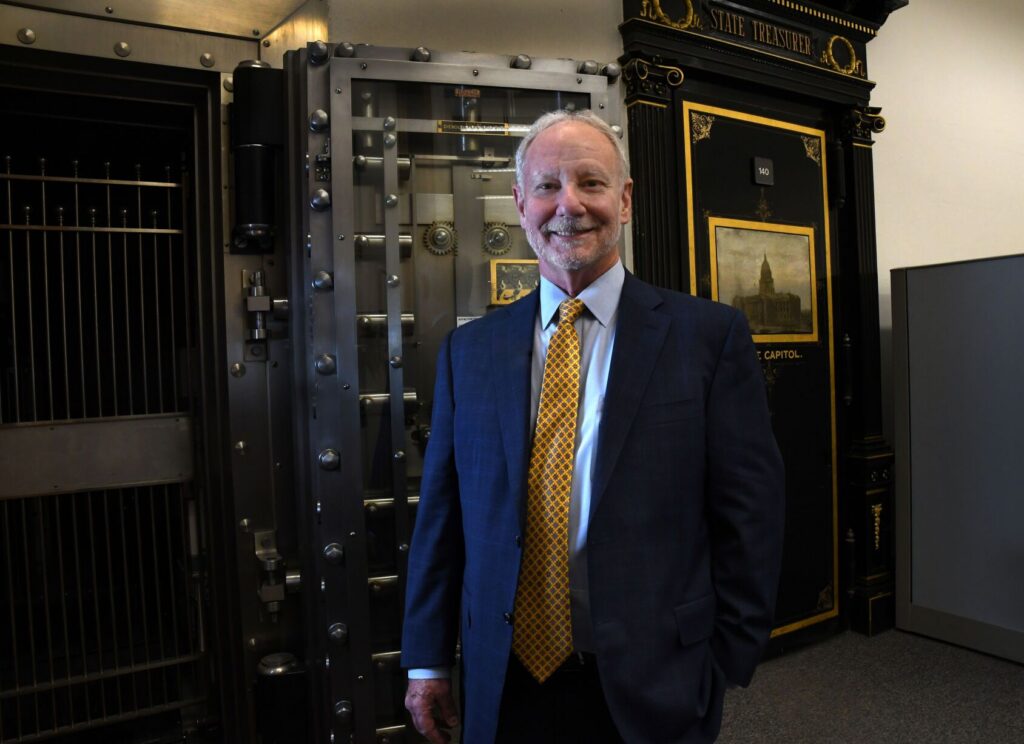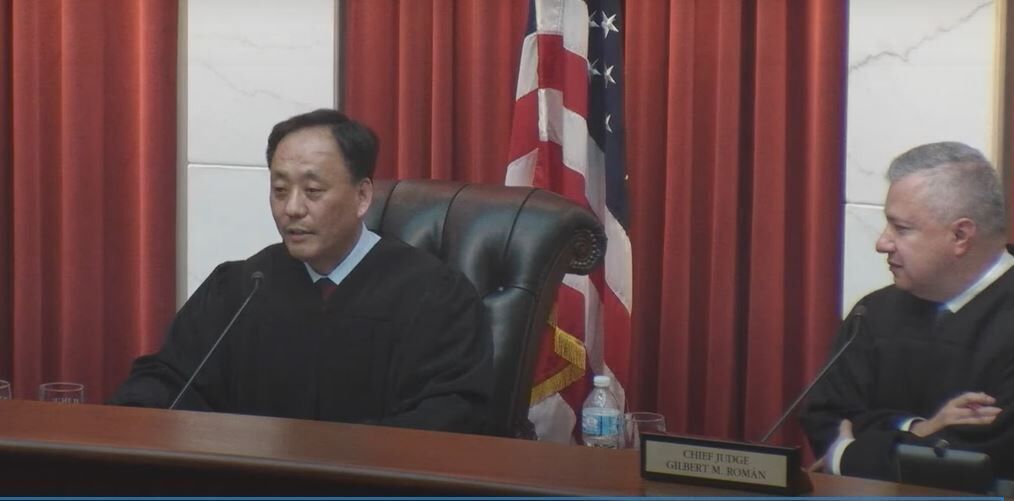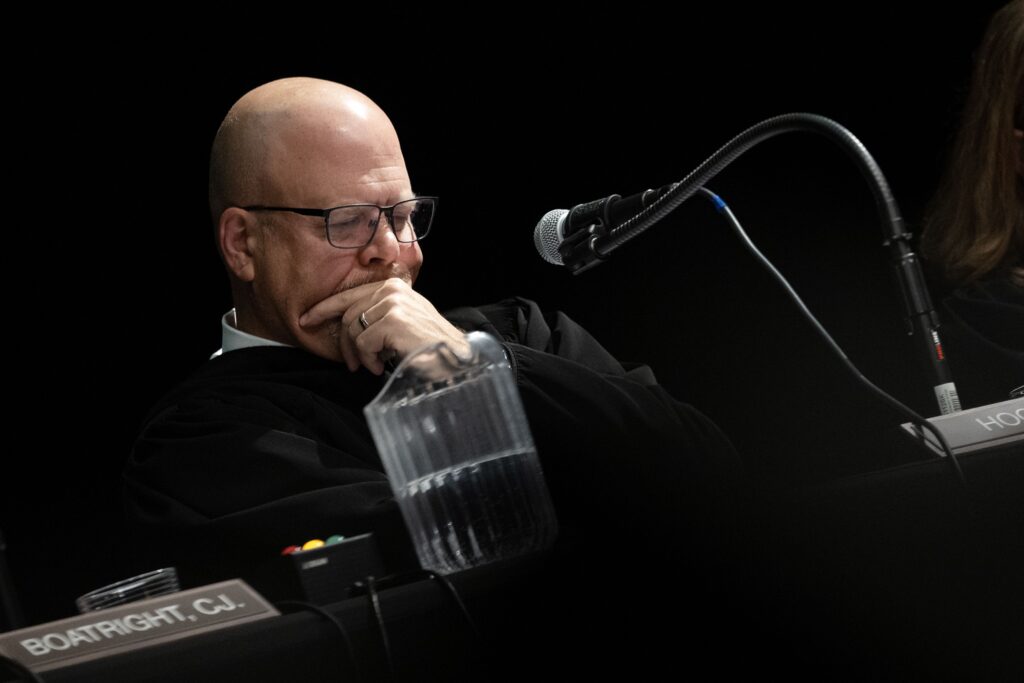Judicial discipline proposal draws Colorado lawmaker skepticism

During a legislative oversight hearing on Friday, judicial leaders revealed that a man who broke into the Ralph L. Carr Colorado Judicial Center earlier this month caused $35 million in damage, resulting in several offices being off-limits for months to come.
Chief Justice Brian D. Boatright told members of the House and Senate judiciary committees that he was confident the break-in on Jan. 2 was a random act, in which Brandon Olsen allegedly shot his way into the portion of the Carr Center that houses offices for various agencies.
Olsen “set a fire on the seventh floor and there was extensive damage. The sprinkler system went off and ran for a couple of hours,” Boatright said.
The presentation from the Judicial Department came amid the multi-day oversight hearings that legislative committees hold annually.
Boatright and State Court Administrator Steven Vasconcellos alerted lawmakers that the water and fire damage and resulting effects to air quality have resulted in the court side of the Carr Center being closed to the public until next week, with the office side facing more extensive rehabilitation.
“In terms of timelines to reoccupy the facility: for the floors that were substantially undamaged or lightly damaged, all they require for reoccupation is cleaning,” said Vasconcellos, estimating those areas would open around March 1.
For the heavily damaged floors, they would be off-limits for the next year, affecting the Colorado Attorney General’s Office and the Office of Attorney Regulation Counsel. Vasconcellos called the building a “disaster recovery site and not a workplace at the current moment.”
“The numbers you shared and the timeline just seems extraordinary,” acknowledged Sen. Julie Gonzales, D-Denver.
Rep. Matt Soper, R-Delta, asked whether Olsen’s alleged actions damaged legal records or otherwise compromised the “ability to serve justice.”
“The honest answer is it’s too early to know,” responded Vasconcellos.
Judicial Department
In the remainder of the presentation, Boatright reiterated his concern that the pay for judicial staff throughout the state, including probation personnel, is unsustainably low.
“We do have a need for judges,” he said. However, at the most recent judicial conference, the judges “all conceded that our No. 1 thing needs to be to take care of our employees.”
Boatright elaborated that 40% of judges were appointed in the last four years and 50% of staff have also turned over. The judicial leaders highlighted the need for more training of staff, given the large number of new personnel, as well as replacement of the 27-year-old case management system.
Other big projects include an evaluation of the role of magistrates, who are hired to help with the workload in trial courts. Vasconcellos also indicated he is working to propose a “narrow fix” to a law passed last year about the confidentiality of children’s names in criminal records.
In response to questions about judicial turnover, Boatright said a naturally aging bench is part of the issue, but judges are also facing higher caseloads and greater demands on their time.
“The other thing that we’ve noticed is the number of people applying to be judges is significantly down,” he said.

Rep. Javier Mabrey, D-Denver, asked Boatright about a conflict between the judicial branch’s directive to trial judges about live streaming criminal proceedings and a bill he sponsored last year that contains a broader mandate in favor of streaming.
“What is state judicial doing to manage this conflict and ensure statewide compliance with the law?” Mabrey asked.
Boatright said it is “something that’s on our radar” and he would likely amend the directive within months.
Judicial discipline commission
The Colorado Commission on Judicial Discipline reported that in 2023, it received a record number of complaints alleging judicial misconduct: 346, up from 249 the year before.
Although the majority of complaints are dismissed each year because they do not state a violation of the code of conduct, commission director Christopher Gregory noted that a substantial number of complaints, nearly 21% of the total, related to the failure of dozens of judges to correctly file their financial disclosure reports, as The Denver Gazette reported last year.
Jim Carpenter, the commission’s vice chair, advised lawmakers that judges seem to be confused about their disclosure obligations as the law is written.
“We think it’s an important area of investigation and probably requires a legislative fix,” he said.
The commission also raised eyebrows by floating a change to the senior judge program, in which retired judges may continue to handle cases on a contract basis when special circumstances arise. Currently, there is a bar on entering the senior judge program if a judge has any disciplinary history.
Gregory advocated for disciplinary history being “a factor,” rather than “the factor” prohibiting participation.
“Part of the reason that we want this statutory change is that judicial discipline is multi-faceted and on the one hand, yes, there’s a punitive component. On the other hand, in the vast majority of cases, you have well-meaning judges who may have made a mistake,” Gregory said. “The whole point would be, how can we provide them the rehabilitative resources so they can continue to make a positive contribution, both to their work and to the judicial system in general, if we have this categorical bar?”
Members of the judiciary committees gave the idea a chilly reception.
“I’ve got some concerns about your legislative priorities,” responded Rep. Leslie Herod, D-Denver.
“We spent a lot of time last year just talking about transparency, particularly around judicial discipline,” added Rep. Jennifer Bacon, D-Denver. “So, there’s some curiosities there.”
Department of Law
Attorney General Phil Weiser provided a detailed list of his office’s priorities, from defending Colorado’s water rights and water quality and enforcing fair housing laws to supporting rural district attorneys’ offices in handling complex cases.
“We’re requesting more resources because this work is work that’s critical and at this point, we’re underfunded to do,” said Weiser, who is seeking $549,000 for a specialized prosecution unit.
Wesier also asked lawmakers for $600,000 to enter into an agreement with the U.S. Attorney’s Office, whereby Colorado would provide personnel to help the federal governement prosecute gun offenses.
“Why is the U.S. Department of Justice not funding these prosecutions?” wondered Sen. Dylan Roberts, D-Frisco.
Weiser acknowledged it would be ideal for Congress to provide more funding to federal prosecutors, but he said the benefit of using state resources in federal investigations would result in a convicted defendant ultimately serving a sentence in the federal prison system, conserving space in Colorado’s Department of Corrections.
Multiple legislators asked Weiser about a case he argued before the U.S. Supreme Court last year, Counterman v. Colorado. The nation’s highest court, in reviewing Colorado’s stalking law, concluded there needs to be evidence of a defendant’s mental state for a conviction to pass constitutional muster.
“Do we need a bill to go to the statute at issue in the Counterman case?” asked Rep. Mike Weissman, D-Aurora.
Weiser responded that a modified jury instruction would be the best solution, rather than a change in the stalking law. He said the Supreme Court’s ruling showed “a lack of sensitivity to stalking victims.”

Public defender
Megan Ring, who leads the Office of the Colorado State Public Defender, was appreciative of the funding lawmakers previously provided for increased salaries, saying attrition is down as a result. However, the problem of unsustainable workloads still persists, with the public defender’s office seeking an additional 70 attorneys.
“We’ve seen a 4,500% increase in discovery since 2016,” she said. “Body-worn camera has been phenomenal. We need to have that. But it is so much data.”
James Karbach, the office’s legislative policy director, also raised the problem of long wait times for mentally ill defendants who are in custody pending competency restoration services. He said public defenders are seeing “more folks in crisis” and more acute mental health issues.
Karbach referenced multiple decisions by federal judges in recent months warning about the constitutional implications of Colorado’s inability to provide sex offender treatment to those awaiting parole. He alerted lawmakers to an impending class action lawsuit that would carry financial liability for the state.
Finally, the public defender’s office raised concerns about the legally mandated live streaming of criminal proceedings – specifically, that witnesses will remotely watch trials and tailor their testimony accordingly, with no way to detect such impropriety.
Alternate defense counsel
The Office of the Alternate Defense Counsel, whose lawyers represent criminal defendants when the public defender’s office has a conflict, reported that it is in the process of hiring support staff for a new postconviction unit. It also has selected two fellows to work in small communities on the Western Slope, with the goal of having the fellows eventually establish their own law firms in the “legal deserts.”
Rural regions “tend to have no lawyers present,” said Darren Cantor, the office’s deputy director. “Less than 1% of Colroado attorneys have addresses in the rural legal areas.”
The office is asking this year for an increase in compensation for non-attorney personnel, such as investigators and paralegals.
Access to Justice Commission
Colorado’s Access to Justice Commission, which advocates for greater resources for civil litigants and affordable legal representation, urged lawmakers to create an “equal justice fund” supporting existing legal aid organizations. Elisa Overall, the commission’s director, said neighboring states, such as New Mexico and Wyoming, provide greater apportionments of legal aid than Colorado does.
“In reality, we’re woefully behind,” she said. “Our legal aid providers have to turn away a full half of eligible clients that come to their door because they’re so underfunded.”
Overall added that more than 70% of litigants in domestic cases are unrepresented court. She asked lawmakers to support a bill that would help implement the Colorado Supreme Court’s creation of a licensed legal paraprofessional program, where non-lawyers with the requisite credentials can offer limited representation in divorce, custody and related matters.
The first class of paraprofessionals will sit for an exam in the fall.














